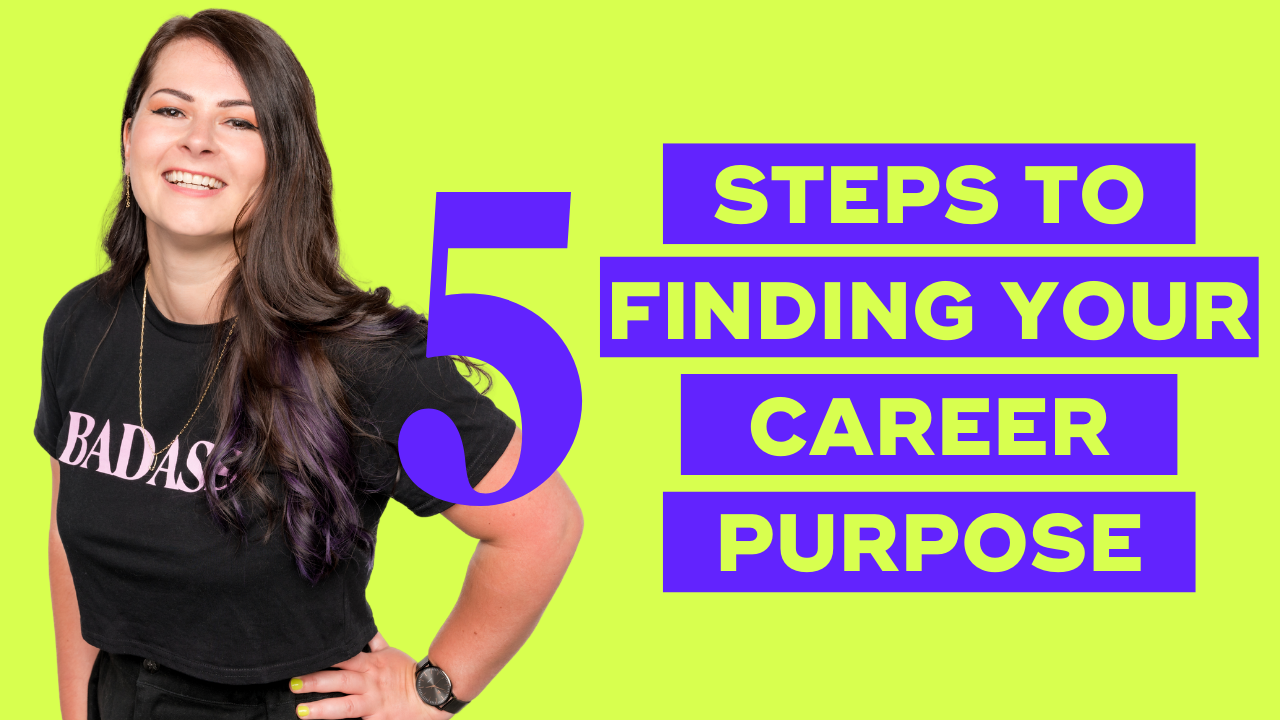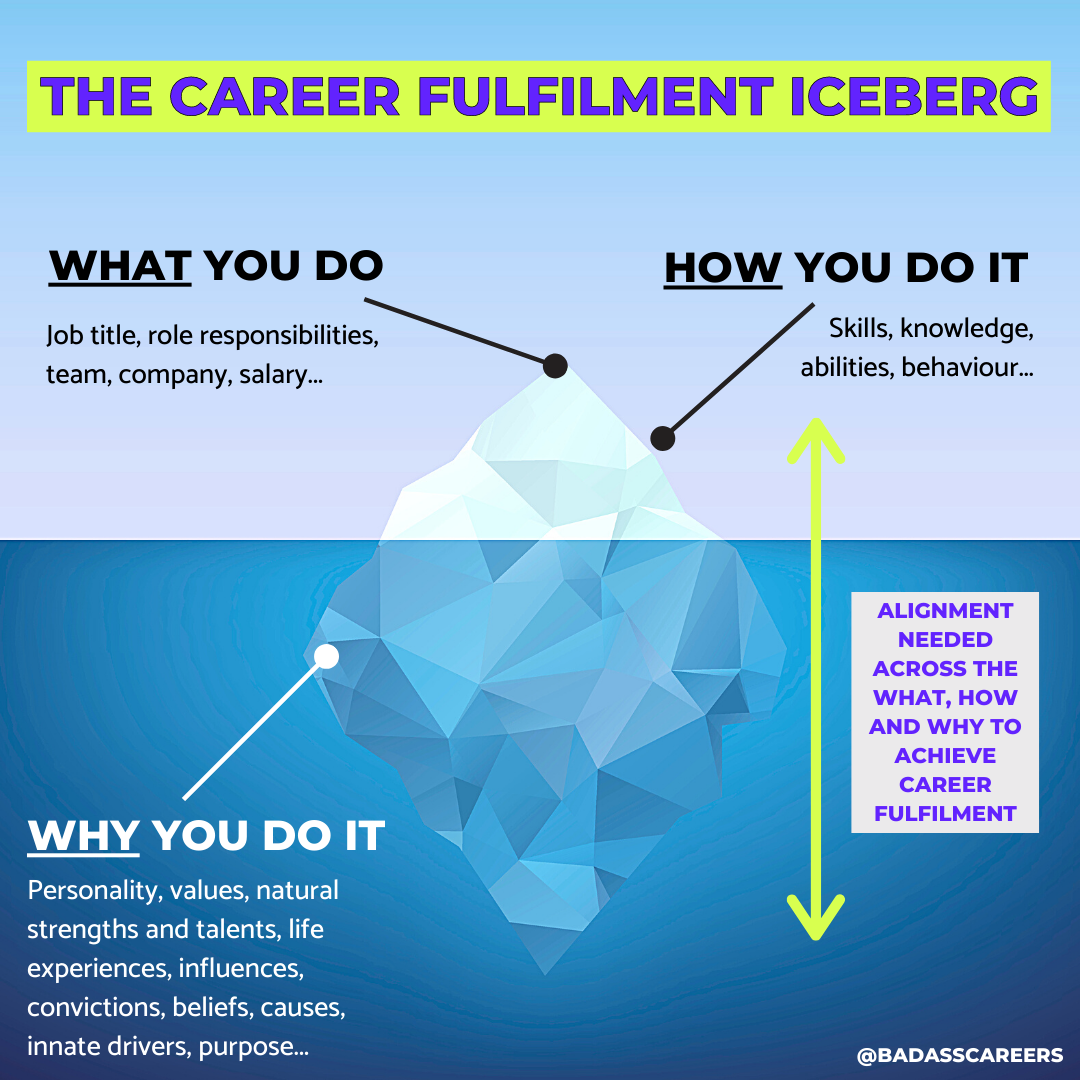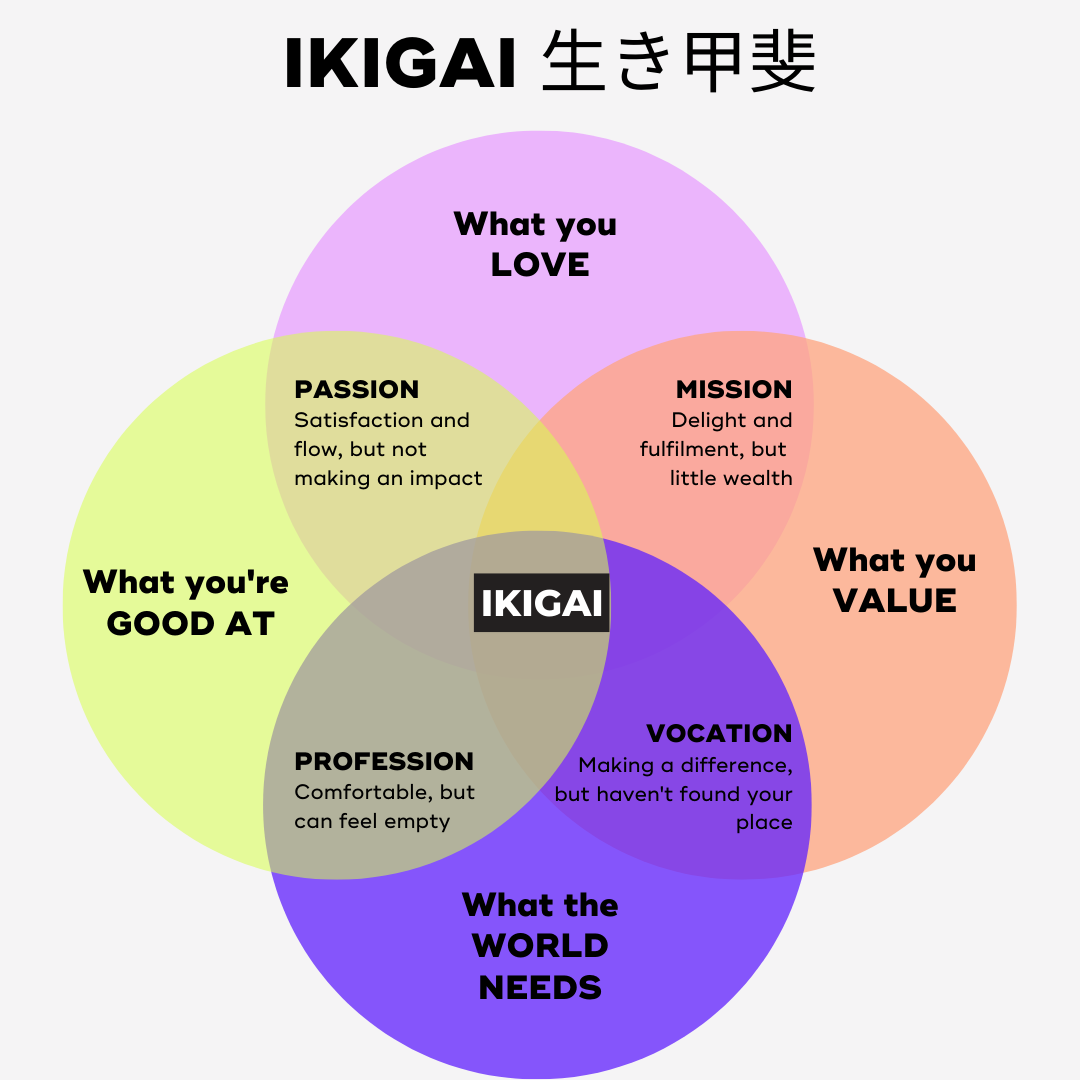5 Steps to Finding Your Career Purpose (no backpacking required 😅)
Jul 22, 2022
"What is your WHY?" - would you be able to answer this question? 🤔
Whether we know it or not, we each have a WHY, or career purpose. A career purpose creates a sense of meaning, like you're on a mission to do something worthy. It integrates who you are with what you do, and connects it to the impact you want to make on this world.
Knowing your WHY provides a filter through which you can make decisions, every day, to act with purpose. You have a sense of clarity. An internal GPS to guide you on this kickass road trip we call a career.
Importantly, career moves become easy because you can assess whether the role would really be an expression of your WHY, or whether it's just shiny object syndrome (a job that looks great on paper but leaves you feeling drained 6 months in). Likewise, you’ll be able to pursue volunteer activities, join clubs, and enjoy various passions and hobbies outside of work that really 💡 light you up 💡. Think of it as your north star, guiding you towards the activities which will be the most meaningful for you.
In a nutshell, once you have your WHY in hand, you’ll be able to answer some of the most important questions in your career:
- WTF should I be doing with my career?
- What would make me happier at work?
- What makes me different?
- What’s my greater calling?
- Isn’t there more to work than this?! (hint: yes, yes there is).
So, what is your purpose? While I hope to take you one step closer to answering this existential question by the end of this article (ambitious, I know), first we need to explore a different question:
Why doesn’t anyone teach us about career purpose?
Ahhh, careers. They kind of just happen to us, don’t they?
I mean, how many of us are cruising along a career trajectory that we chose at 18 years old just because it seemed like a safe option at the time? Or because one of our parents worked in the field? Or because we just kind of just fell into it without really thinking it through?
And Karen the Career Counsellor/Librarian at school was no help - she’d been out of the workforce for 20 years! She recommended printing your cookie-cutter CV on classy marbled paper using Times New Roman font and invariably told anyone decent enough at math to pursue Accounting. Good one, Karen.
So we kind of just go with the flow, hoping we’ll figure it out as we go. But how is this method working out for us, really? Well, some of us get lucky and find our ‘thing’ along the way. Others, not so much. According to Gallup, only 15% of employees are engaged in their work, meaning they actually care about their work and their company. TGIF, am I right?!
On a more serious note, don’t you think it’s a bit strange how we’ve come to normalise hating what we do for 40+ hours per week? I think it’s high time we stop pretending that it’s okay to just survive the weeks, waiting for happiness to finally kick in on the weekends. We are living in an age of unprecedented opportunity, where we can design some of the most diverse, fulfilling, and exciting career experiences we’ve ever seen.
It’s time to find the missing ingredient to doing work we love. Purpose.
What is a career purpose, anyway?
Great question! I’ll even give you some concrete examples from real clients near the end of this article. But first, your WHY (or purpose) isn’t a job title. 'Social Worker' isn’t a WHY. That's just WHAT you do.
A WHY is something bigger, deeper. For example, 'using my strengths in empathy and communication to help people who face significant hurdles in life, specifically in the critical periods of childhood and adolescence' might be your WHY. It usually stems from your innermost values, beliefs, life experiences, and natural talents.
So with this WHY, you could indeed work as a Social Worker. But you might equally enjoy being a School Counsellor, Sexual Health Educator, Dance Teacher for underprivileged youth, Manager of a community centre - the possibilities are vast. These would all be legitimate expressions of your WHY.

So why bother putting in the effort? What’s the point in getting to the bottom of all of this?
Put simply, people find meaning when they see a clear connection between what they value and what they spend time doing. And it feels pretty damn good, too. Research shows people who can articulate their WHY are happier in both work AND life. Heck, they even live longer!
How do I find my career purpose?
Truth Bomb: You do NOT have to go backpacking, or do a silent yoga retreat in Bali, to find your purpose.
Before you apply for your sabbatical year and book that one-way ticket to Patagonia, I just want you to know that it absolutely is possible to figure out your purpose just by listening to the information you already have inside of you.
In my Youtube video, I walk people through one of my favourite models for asking yourself those profound, sometimes uncomfortable questions: the Ikigai framework.
What is Ikigai? How can Ikagai help me?
Ikigai is a Japanese concept that loosely translates to “reason for being". In other words, your life’s mission, raison d'être, the reason for getting out of bed in the morning. A way to infuse each day with a little more meaning. Your Ikigai, or purpose, lies at the intersection of 4 components: what you're good at, what you love, what the world needs, and what you can be paid for.

If you've ever felt lost, stuck, like you kind of accidentally fell into your career, or you're not sure if what you're doing right now is your thing, the Ikigai framework can be REALLY useful for finding direction. In fact, it’s the exact framework I used to switch from Fortune 500 HR Manager to Entrepreneur and Founder of Badass Careers.
So, let's dive right in shall we?
Step 1: Figure out what you’re really good at
The first quadrant of the Ikigai framework is all about your strengths, skills and what you can offer the world. As we head towards more portfolio-like, self-managed careers in the new age of the gig economy, it’s more important than ever to understand what sets you apart and how to leverage that.
It’s important to ask yourself questions that are designed to tap into the underlying gifts that enable things to come naturally or easily to you. Strengths that, once applied, will develop your skills in that particular area very quickly. Some of the questions you might ask here include:
- Everybody has an unfair advantage, the things that seem to come naturally to them, without much coaching or studying. What do you tend to understand more quickly than most people? What do you find fun that other people might find difficult or boring?
- You receive a text from a friend who needs advice or needs to be taught something. What are they likely turning to you for? What kind of advice do people tend to seek from you? What skills have you ever taught someone (big or small)?
- What makes you, you? What makes you weird (being weird is good)?
Step 2: Know what makes you come alive
The next quadrant of the framework is all about your passions, the things that really light you up!
Understanding your passions is a really important piece of the puzzle because it gives us clues about what energises you as a person, so we can either work towards integrating these things into your career or a side hustle, or we can use them to predict the kind of work and activities that will bring you the most joy. Some of the questions you might answer include:
- What content do you consume? Books, podcasts, Netflix shows, Youtube videos? Is there a theme, something you love learning about? What kind of articles can you not resist clicking on?
- What's the best gift you’ve ever received? One that showed the giver knows you really well?
- Think of recent times when you were so immersed while working on something, you achieved a state of flow. You felt energised, as though time seemed to fly by without you noticing (unfortunately, sleeping and bingeing Netflix don’t count here!). What were you doing?
Step 3: Get crystal clear on what matters to you most (your values and convictions)
The third quadrant of the Ikigai framework goes DEEP! You peel away the layers to uncover your core values. Values so deep, that they guide your beliefs, behaviour and decision-making (whether you realise it or not). If you’re not fully living these values, you’re likely to feel a nagging inside of you, like something’s not quite right.
For example, if you value family time, but you have to work 70-hour weeks in your job, don’t you think you’d feel internal stress and conflict? And if you don't value competition, and you work in a highly competitive sales environment, are you really going to be satisfied with your job long-term? Or if you chose to become vegan on the basis of animal rights, are you really going to be happy long-term working at a cosmetics company that sells their products in China (the only country that requires, by law, cosmetics to be tested on animals, regardless of where they were manufactured)?
In short, understanding your personal values helps you live an authentic, happy life. Answering the following kinds of questions will help you to get started:
- What gets you fired up? What injustice infuriates you?
- Which of the UN’s sustainable development goals do you feel most strongly about? Why do you think that is?
- Imagine you are hosting a dinner for your role models and could invite anyone you want dead or alive. Whom would you invite and why? Write one characteristic for each of them. What is it about their life and accomplishments that inspire you? What underlying traits or values draw you in?
Step 4: Understanding what you can be paid for
Let’s be real: If you’re not getting paid to do what you do, then your career or business is either a volunteer role or an expensive hobby!
It’s really important to combine what you have to offer with what you can actually be paid to do (demand). Let's be clear: It is absolutely possible to do work that inspires you while earning the income you need to fund your lifestyle! You just need to figure out what problems you can solve, and who is willing to pay you to solve those problems.
To help, I recommend doing your research (including a healthy dose of LinkedIn stalking) to find exciting problems that need solving, as well as uncovering examples of inspiring people doing really cool things to solve those problems.
Step 5: Bringing the Ikigai framework together
By the end of these exercises, you will have your WHY captured in a tidy, yet powerful sentence. Here are some examples of incredible ‘WHYs’ that have emerged from one of my past courses:
Career Coach (what I came up with before starting Badass Careers): My WHY is to leverage my strengths in career development, HR and Psychology to help young professionals to find their purpose, brand themselves and get the job so that they can build their dream career and do work that energises them.
UX Designer: My WHY is to use my passion for empathetic user experience design and my skills in technology to help not-for-profits and charities to create great websites and apps that keep their users coming back.
Baby Sleep Coach: My WHY is to use my experience in getting my babies/friends & family’s babies to sleep through the night to help first-time mothers get more sleep so that they can have a more enjoyable motherhood experience and more energy for themselves as a partner/friend/co-worker.
Interior Designer: My WHY is to use my passion in decorating and knowledge of Chinese design concepts to help boutique interior design agencies to offer a modern twist on traditional Chinese interiors so that they can delight clients who wish to preserve and express this beautiful culture in their homes.
Imagine how great life would be if you were doing work you love. Work that’s so aligned to your personality, strengths, and values that it feels like a natural extension of who you are. Work that feels so rewarding and impactful that it actually energises you. Even better, your newfound sense of happiness and fulfilment overflows into all areas of your life. Naturally, you’re a better partner, friend, and parent now that you’re not feeling so drained all the time.
When you know your career purpose, or your WHY, there’s no more feeling like you’re wasting your time or that you’re not living up to your potential. No more job-hopping from one thing to the next, only to realise you’re still unhappy after the thrill of the new salary wears off.
No one said it would be quick, easy or require little effort, and it may not give you ALL of the answers, but finding your WHY will get you a heck of the way along the journey. So if you’re the kind of person that actually gives a sh*t about your career, I highly recommend putting in the time to uncover your true purpose. Because who doesn’t want to find happiness in every day?!
Ready to get stuck in and find your career purpose? I’ve got just the thing for you! Check out my FREE masterclass Career By Design where I’ll help you to start putting in the foundational work towards your career purpose. You can thank me later 😉
Stay Badass,
Rosie x






